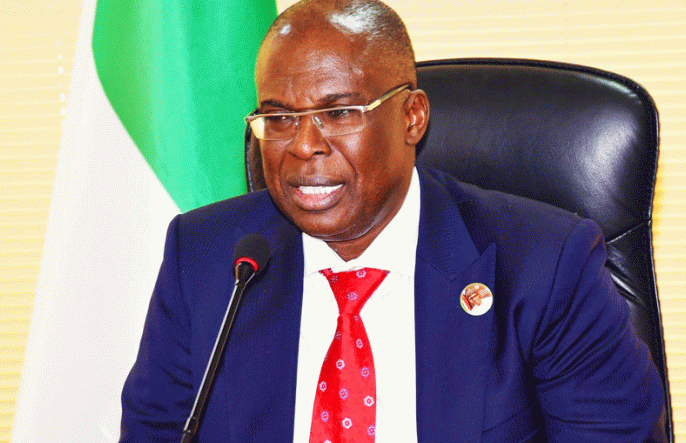FG Admits Security Personnel In N’Delta Conniving With Criminals To Steal Oil

- Says Elumelu wasn’t speaking for the oil industry about 95% losses
- Ramps of monitoring of agents deployed in fight against menace
The federal government yesterday admitted that some security personnel deployed to fight oil theft were heavily involved in collaborating with those stealing the commodity in the Niger Delta.
Minister of State, Petroleum Resources, Mr. Timipre Sylva, who spoke on a national television during a programme tagged “Eagle Eye” last night, noted that the government was planning various layers to monitor the personnel paid to halt the menace.
Definitely, there are collaborators. Even during militancy, we had this issue within the military. So the government could not really enforce the law effectively because of the activities of these collaborators.
If you have something like a crime that has gone on for this long and a joint task force is in place to actually exterminate this crime and the crime has even gone worse, then definitely whoever is in charge is probably not doing their job.
But at this time, the federal government is giving a note of warning and there will be other layers on top of those who are actually operating to monitor them, because the problem is to send people to take care of the crime and if you just leave them on their own, then in many cases they become part of the crime,
he contended.
Sylva stated that the current incessant vandalism of oil and gas pipelines was a metamorphosis of the militancy in the Niger Delta region, which although led to the training of several youths in the region, has extended to the ongoing challenge.
The minister noted that oil theft was not a creation of the Muhammadu Buhari administration, stressing that it has been in Nigeria for decades. He said that at a time there was some sympathy for the culprits, which aggravated the matter.
The minister stated that the situation is no longer sustainable, pointing out that Nigeria is currently losing a lot of its production, a development that spurred the president to act on the matter.
On the recent allegation by a businessman and Founder Heir Holdings, Tony Elumelu, that more than 95 per cent of total oil production is stolen, Sylva said that the business leader was probably talking about his (Tony’s) asset and not the generality of the industry losses.
I saw that tweet from Tony and I would say that Tony doesn’t have an overview of the whole industry. He is pumping his production into one particular pipeline, the TNP line and that is actually one of the most majorly impacted of our pipelines.
There are other pipelines that are not as impacted as the TNP, so he was speaking from his own perspective and he is not in a position to speak for the industry. So if you said he lost 90 per cent of his production I understand, which is a very small production compared to the national production, but that figure does not apply to the whole country,
he declared.
He stated that although he couldn’t say exactly how much oil is stolen, since many conditions impact how much is taken at every point in time, it could be up to 200,000 bpd one day and change the next.
Describing the inability of Nigeria to meet its Organisation of Petroleum Exporting Countries (OPEC) quota, as a sad topic for discussion, he said that it was a combination of factors that were responsible, including lack of new investment as a result of the delay in passing the Petroleum Industry Act (PIA).
In addition, he listed sabotage, vandalism and the challenge of restarting oil wells that were shut down to align with OPEC cuts in 2020.
In trying to shut down 200,000 barrels, you might shut down up to 300,000 barrels because the production is not really mathematical,
he explained, adding that bringing back the pressure to begin pumping has become difficult.
He reiterated that there’s been some improvement , stressing that by the end of this year, production will be ramped up to pre-pandemic levels.
Sylva stated that the negative belief that people could sit down in their homes and have free money introduced by some members of the elite in the Niger Delta was also to blame for the current challenge.
He maintained that it was wrong to equate oil theft to artisanal mining in the north because those miners in the north dig for the commodities while the oil thieves break into readymade and already operational pipelines.
Insisting that it is purely a criminal activity, he made it clear that the government should not just go about destroying the facilities, but should target the arrest of individuals that are involved.
It’s very misplaced and sometimes people equate it with artisanal mining. These are two different activities. Artisanal mining is a situation where men will go down with shovels and head pans and dig for the gold and they find it,
he noted.
He explained that the monster created by the elite was coming back to haunt them in the form of kidnapping, noting that they have now realised the impact of the wrong values inculcated in the youths of the Niger Delta.
Sylva argued that when the federal government sought the help of some leaders in the Niger to tackle the problem, they were rebuffed, but said that the recent efforts by the Governor of Rivers state, Nyesom Wike, had brought to the fore the magnitude of the problem and how it affects everyone.
It’s the same thing with the issue of soot in Port Harcourt. But initially, the state government was not very interested in resolving the issue. Because we tried to approach them but of course, at every point in time, they rebuffed us. They said, this is their way of also getting access to the oil wealth.
But today, the chicken has gone home to roost. Everybody knows that this problem is a problem that will kill all of us. So all hands are coming together to fight the problem,
he added.

Justin Nwosu is the founder and publisher of Flavision. His core interest is in writing unbiased news about Nigeria in particular and Africa in general. He’s a strong adherent of investigative journalism, with a bent on exposing corruption, abuse of power and societal ills.













